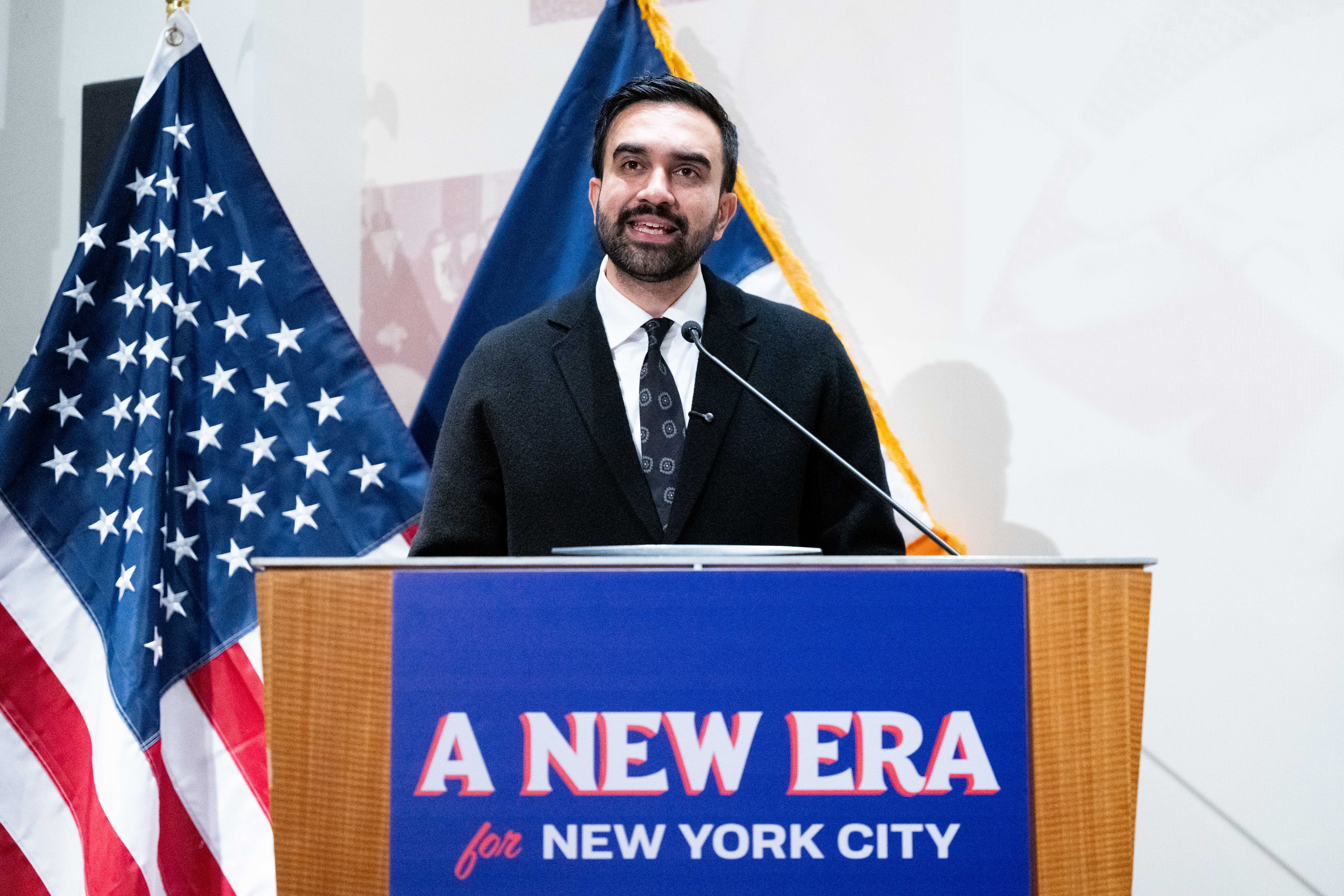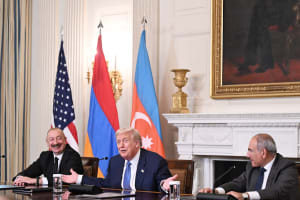Why new NYC Mayor-elect Mamdani hates Israel – it’s not because of Islam or Communism

Zohran Kwame Mamdani, a 34-year-old New York State assemblyman – a Muslim with Ugandan-Indian roots – was elected as mayor of the city with the largest Jewish population in the world. And he hates the Jewish state.
Now, one might argue that foreign policy will not be part of his mandate as mayor of New York City, as his supporters often do; however, Mamdani himself acknowledged that anti-Israel animus is part of the reason he even went into politics in the first place.
Indeed, hostility toward Jews and the State of Israel is central to the thinking and ideology of Mamdani, as well as his Democratic Socialist Party.
While the party likes criticizing those who question their radical views about Israel – and complain that they are being reduced to these topics – Mamdani and his ilk are themselves constantly bringing up the issue.
“The real connective tissue of his politics is Israel and Palestine… he said over and over again, ‘Palestine is why I got into politics,’” Olivia Reingold, who followed Mamdani’s election campaign for the Free Press, told the YouTube channel, Triggernometry.
After Mamdani’s win, the national branch of the Democratic Socialists of America praised it as a “victory for Palestine,” noting that “Zohran wasn’t afraid to say boldly… that Palestine should be free, and that the US shouldn’t be complicit in Israel’s genocide.”
Throughout the campaign, Mamdani declined to condemn the phrase “Globalize the Intifada,” vowed to arrest Israel’s prime minister should he visit New York – because of the outstanding International Court of Justice arrest warrant – and, for a long time, didn’t want to say whether Hamas should disarm.
However, despite his background being used to attack him as a Communist, a Jihadist, or both, Mamdani’s hatred for Israel is not rooted in Marxist doctrine or Salafist Islam – rather, he is the epitome of “Third Worldist” ideology.

What is ‘Third Worldist’ ideology?
“He [Mamdani] comes at politics from an extremely academic place… his father is a professor at Columbia University who specializes in colonization and decolonization studies, so this is a guy who is steeped in academic leftist ideology,” Reingold explained.
Third-Worldism began as a concept and a mindset among intellectuals, most of them studying in the West but hailing originally from places that used to be – or still were at the time – colonies of Western states.
Zineb Riboua, a research fellow at the Hudson Institute, describes this ideology as “a postcolonial moral project born in the mid-twentieth century that recast politics as a global uprising against Western hegemony.”
Many of the newly created nations in the wake of decolonization then became “non-aligned” states that didn’t want to take sides in the Cold War – the so-called “Third World.”
However, while most of those nations didn’t want to align themselves fully with either the United States or the Soviet Union, they certainly shared a common enemy with the Soviets.
The intellectuals, many of them from non-Christian backgrounds, soaked up the socialist ideology surrounding them during their studies in Paris, London, or other European capitals, blending these influences with their grievances against the colonial powers to give rise to a new ideology.
Hussein Aboubakr Mansour, a research fellow at the Institute for the Study of Global Antisemitism and Policy, called Third Worldism “that pastiche of Marxian slogans, anti-Western rage, grievance theology, anti-Christian spite, and avant-garde aestheticism.”
“Born in mid-century France, half Sartrean existentialism and half Parisian café radicalism, it had its brief apotheosis as the banner of liberation after the Second World War,” Mansour wrote.
Radical thinkers like Aimé Césaire and Frantz Fanon, as well as future leaders of newly created states like Vietnam’s Ho Chi Minh and Michel Aflaq – the father of Ba’athist Arab nationalism – gave rise to an ideology that substituted a Marxist class struggle with the struggle against “the colonizers.”
These ideas took the world stage during the Algerian War of Independence (1954-1962), offering a preview of how the ideology would operate in practice.
In a brutal struggle that claimed the lives of many civilians, Algerian forces expelled the French colonial forces back to France, taking most non-Muslim minorities with them.
Already in this war, Algeria’s centuries-old Jewish community was identified as part of the foreign oppressors, eventually causing almost the entire population to flee to France.
“Many Algerian Jews were poor and socially marginalized, but they were depicted as embodiments of colonial privilege and moral complicity, seen as sharing in the power that oppressed them,” Riboua writes.
The war also greatly inspired the Palestinian Liberation Organization (PLO) in its conviction that a guerrilla war against “foreign oppressors,” whether French or Israeli, might be successful by sending them “back where they came from.”
The rise of these ideas coincided with the collapse of support for Israel among left-leaning parties across the world in the second half of the 20th century.
This shift had several causes, such as the rise in prominence of Third Worldist thinking at universities, but also Israel’s increasing alignment with the U.S. and other Western countries, and its military victories that resulted in the capture of large territories in Judea and Samaria, the Golan Heights, and the Sinai Peninsula.
Not seen as a plucky Socialist project any longer, Israel could now become a symbol of the “colonizers” and “imperialists,” a powerful oppressor of the weak but heroic Palestinian resistance fighters.
Unlike religiously motivated hatred of the Jewish people in Islamist movements, the radical left-wing ideology of the Third Worldist kind hates the Jews, and most of all, the Jewish state, as a personified Western, colonial, imperialist (insert another progressive buzzword here) power.
“Third-Worldist movements increasingly framed their politics through anti-Zionism, portraying Israel as the last fortress of Western imperialism and Palestinian resistance as the moral center of a global struggle,” Riboua explains.
This is also why Jews who don’t support Israel, many of whom often identify more strongly as progressives than as Jews, are a welcome part of Mamdani’s coalition.

The roots of Mamdani’s hatred for Israel
Over the past decades, Third Worldist grievances have become core parts of curricula at elite universities across the West, like Mamdani’s famously progressive Alma Mater, Bowdoin College.
According to an article in The New York Times, his professors said Mamdani already arrived on campus “with a sense of what he wanted to study,” and possessed “a well-established politics, imparted from his parents and their rarefied social circles.”
“His studies complemented his commitment to political activism. At Bowdoin, he formed a chapter of Students for Justice in Palestine… and unsuccessfully tried to persuade Bowdoin to join an academic boycott of Israel.”
This ideology explains some of Mamdani’s statements that would appear strange without context. For example, “I was somebody who began my journey in organizing and in politics by co-founding my school's first Students for Justice in Palestine. The struggle for Palestinian liberation was at the core of my politics and continues to be.”
Mamdani’s motivations are mainly ideological; they lie neither in ethnic solidarity nor in Muslim camaraderie.
He is not Arab but ethnically Indian; and while he is Muslim, he is a Twelver Shia, unlike Palestinians, who are Sunni Muslims.
He is also, very obviously, not a strictly observant Muslim – something many in the Arab world were apparently shocked to find out only when they were confronted with Mamdani’s pro-LGBT stances after first celebrating his win on social media.
However, Third Worldist thinking is very welcoming to Islam, which it treats as “an emblem of subjugation with universal resonance, a faith recast as resistance and moral cohesion against Western dominance,” as Riboua puts it.
Mamdani further impersonates the anti-Western, anti-colonialist ideas through his background: His family’s background is in Uganda and India, both former English colonies, and his father is a prominent postcolonial scholar at Columbia University.
All of this is expressed in his politics, where, Riboua writes, “Israel becomes the final expression of colonial Europe, and the Jew is recast not as a victim but as a symbol of enduring Western power. Opposition to Israel thus functions as a continuation of decolonization, a moral conflict that transforms the old fight against empire into a permanent contest between innocence and guilt.”
Notably, the first major U.S. political figure in this mold was Barack Obama. Like Mamdani, Obama has strong family connections to former colonies – with a Kenyan father and childhood years spent in Indonesia – later becoming a left-wing student activist, and was famously suspected of being Muslim.
Of course, Obama either held less radical positions or knew how to tone them down significantly.
But now, it may be that the time has come for an unabashedly anti-Israel and socialist Third Worldist progressive to lead the world’s most culturally important city, and many others are ready to follow Mamdani’s example by attempting to hijack the Democratic Party.
It is not unimaginable that either he or someone ideologically close to him, like fellow Democratic Socialist Alexandra Ocasio-Cortez, could become president one day soon.
As so often in history, Jews could once again end up playing the role of canary in the coal mines, becoming the first group – but certainly not the last – to suffer from this toxic ideology.
Want to help more people find our reporting from Israel? Leave a quick Google review of our website here.

Hanan Lischinsky has a Master’s degree in Middle East & Israel studies from Heidelberg University in Germany, where he spent part of his childhood and youth. He finished High School in Jerusalem and served in the IDF’s Intelligence Corps. Hanan and his wife live near Jerusalem, and he joined ALL ISRAEL NEWS in August 2023.
You might also like to read this:

















